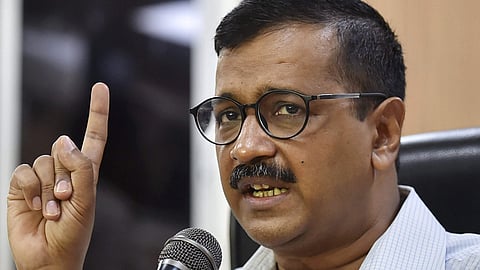

NEW DELHI: The CBI in its affidavit filed before the Supreme Court said that the Delhi Chief Minister Arvind Kejriwal would tamper with evidence if he would be enlarged on interim bail by the SC in the Delhi excise case.
The CBI filed its reply in the top court while responding to the pleas filed by Kejriwal seeking quashing of his arrest and interim bail by the Central agency in the Delhi excise policy case.
"Being a prominent politician and Chief Minister of Delhi, the petitioner Arvind Kejriwal is very influential, and may influence the witnesses, potential witnesses and evidence already exposed before him during the custodial interrogation. He might likely tamper with the evidence to be further collected," the Central Bureau of Investigation, in its affidavit, told the SC.
The CBI made it clear in its affidavit that despite repeated orders passed by various courts being prima facie satisfied with the commission of the offences herein, for which cognizance already has been taken, the petitioner was simply attempting to politically sensationalize the case before this Court.
"Such unwarranted averments are liable to be discarded," the CBI said in its affidavit.
During the hearing on Friday, a two-judge bench of the top court, led by Justice Surya Kant and Justice Ujjal Bhuyan, adjourned the case to September 5 and granted one week time to the CBI to file a counter-affidavit.
The Supreme Court seeks detail response from CBI on the plea challenging Kejriwal's arrest
The Supreme Court on August 14, refused to grant any interim relief to Kejriwal and issued notice to the CBI seeking its detailed response by August 23 on his plea challenging his arrest by the CBI.
On the last hearing, Kejriwal's counsel and senior lawyer, Abhishek Manu Singhvi said that the CM's arrest by CBI in June was an "insurance arrest" as it was effected at a time when he was on the cusp of getting bail in the more stringent ED case under PMLA. Singhvi desperately pleaded to the apex court for an interim bail on health grounds, but the apex court had declined it.
The lawyer said that this is a strange situation. Three orders of release/bail under PMLA and a rejection of bail in a case not even dealing with section 45 of the Prevention of Money Laundering Act (PMLA). There are three orders, one in May, June and then a regular bail by the trial court in the ED case which was later stayed. Then the CBI investigated and interrogated me one year ago.
Narrating the case details, he said that when then SC on July 12 passed a detailed judgment and then this arrest was made by the CBI which was an "Insurance arrest."
It is pertinent to note here that Kejriwal was already being granted bail by the top court on July 12, in the same case, being investigated by the Enforcement Directorate (ED). He was arrested by the CBI on June 26 in the case.
Kejriwal in his plea had termed his "arrest by the CBI as illegal" and sought quashing of it.
The apex court in its verdict on July 12, released him on interim bail in the Delhi excise case said that Kejriwal had suffered incarceration for more than 90 days and said that he was an elected representative while granting him interim bail.
However, on August 5, the Delhi High Court upheld the arrest of Chief Minister Kejriwal by the Central Bureau of Investigation (CBI) in connection with the alleged excise policy scam. This decision came as a severe blow to the Aam Aadmi Party (AAP) leader's efforts to challenge the arrest.
Justice Neena Bansal Krishna, presiding over the case, dismissed Kejriwal’s plea stating that it was conducted with justifiable reason. The court also advised him to seek relief from the trial court. The HC had reserved its verdict on July 17 regarding Kejriwal’s challenge to his arrest by the CBI. On July 29 regarding his bail plea after hearing arguments from both Kejriwal’s counsel and the central agency.
The court also observed that the argument of the Special Public Prosecutor has merit. While dismissing the bail plea, the court in its order said that It may also be noted that when the bail application was filed before this Court, the charge sheet had not been filed. However, in the changed circumstances, when the charge-sheet has got filed before the learned Special Judge, it would be in the benefit of the petitioner, to first approach the Court of Sessions Judge,” the order read.
Delhi CM was arrested on March 21 in the money laundering case
Kejriwal was taken into CBI custody on June 26 while he was already in judicial custody at Tihar Jail related to a money laundering case filed by the ED.
Initially arrested by the ED on March 21, Kejriwal was granted bail by the trial court on June 20 in the money laundering case. However, the high court stayed this order. On July 12, the Supreme Court granted him interim bail in the money laundering case.